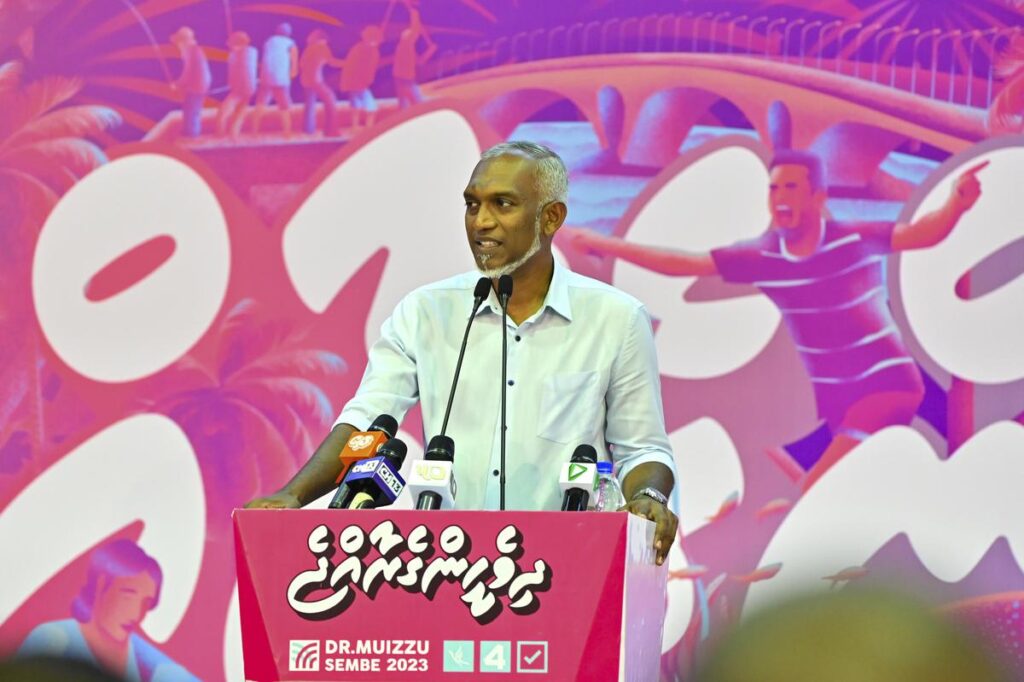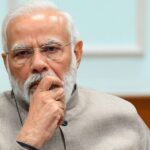Maldives incoming president Mohamed Muizzu has been giving sleepless nights to the Indian establishment by touching a raw nerve: the presence of Indian military personnel in the Indian Ocean archipelago nation. The 45-year old Muizzu has been the mayor of Male, the densely-populated capital city of Maldives, since 2021. The outgoing president Mohamed Solih had publicly proclaimed when he took office in 2018 that he would mend and repair relations with India. The bonhomie saw the Indian government signing projects worth $800 million with Maldives, on soft Indian loans, including a dockyard project during Solih’s tenure.
The UK-educated Muizzu is adamant that he would see the back of every single military personnel in the country with over 1000 islands and just half a million population. But Solih says the presence of nearly 70 Indian military personnel in the country is related to the dockyard project. It was Solih’s immediate predecessor Abdulla Yameen Abdul Gayoom’s pro-China tilt that caught the world’s attention provides the context to Muizzu’s anti-India stance.
Maldives’s nearest land border is India at 600 km and Sri Lanka at 670 km. The capital city Male is only 2.6 meters above the sea level. The fact that over 1000 of Maldivian islands are not even one-meter above the sea level makes this entire geography extremely ecologically unique and sensitive. Given the rising sea levels, most of Maldives will be under water by 2050. In 2008, President Mohamed Nasheed, who is the speaker in the current parliament, had floated plans to purchase land in Australia, India and Sri Lanka fearing that his country might by inundated by the rising sea levels.
But his policies of adopting the path of carbon neutrality and solar power was junked by the new president Abdulla Yameen, who favoured mass tourism and mega development. Experts say that rising sea water levels is at the root of many other problems that will unfold in coming years. For example, the warming of sea water temperatures and the acidity levels are killing the coral reefs. Maldivians’ life and livelihood are already hit by reduced rainfall and changed fishing patterns. In the coming years when people from smaller islands migrate to bigger ones, basic logistics and sanitation management is going to be issues of immediate concern.
Given this, Muizzu who is taking charge as the new President on November 17, is not picking the issues of real concern and outlining how he would deal with them. By picking an issue that can grab international headlines, and make the political temperatures rise in the Indian ocean, Muizzu is making the same old mistakes that politicians are famously so prone of: Going ahead of themselves!
As the new president, Muizzu’s priorities should be his people. He can take India into confidence and ask it to call back Indian military personnel from his country. The number of Indian military personnel in Maldives is not significant. A much larger Indian contingent is deployed in Sri Lanka or Nepal. Even China has its military personnel in other countries where it has important infrastructure projects going on.
So, is Muizzu trying to go ahead of himself? Is he trying to promise more than he can deliver?
Large number of Indian and Chinese army personnel patrol thousands of kilometres of borders for decades but, barring a few occasions and incidents, they have seldom created genuine security flare-ups. The reason for this is that the leaders in these two countries have often recognized that they are not ahead of the geographies that they represent.
Qin Gang, the top Chinese diplomat, who transformed clueless diplomats into wolf warriors, making Chinese diplomacy shake the world was recently removed as the foreign minister. Similarly, Li Shangfu, the Chinese defence minister who was recently sacked, had spoken eloquently, addressing defence officials from 50 African countries at the China-Africa Peace and Security Forum in August, how cooperation rather than conflict is the new Chinese defence strategy.
The removal of Qin Gang and Li Shangfu underscores the importance of realizing the limitations of the leadership in creating or controlling conflicts. For a leader who is accountable for the lives and welfare of people must not reveal his cards. Surely, Muizzu is not revealing his cards fully yet. He is not going to rub India on the wrong way.
After all, Maldives is a happy tourist destination for most Indian Bollywood A-listers. The country is also home to significant Indian investments. It’s before Greta Thunberg sends him an ultimatum, the erudite Muizzu should redraw his priorities and make them public. (IPA Service)




 Modi More A Threat To His Own Party, Less Prime Danger To Opposition
Modi More A Threat To His Own Party, Less Prime Danger To Opposition 